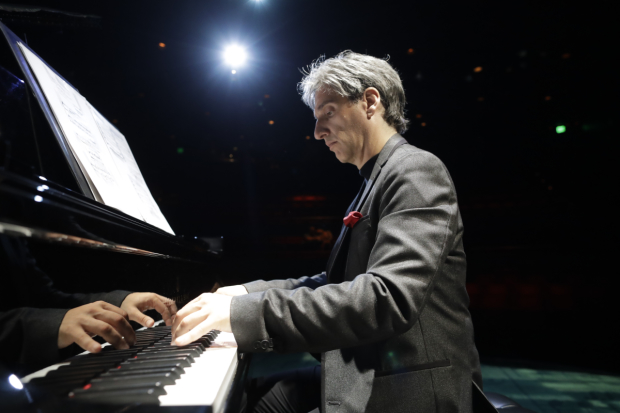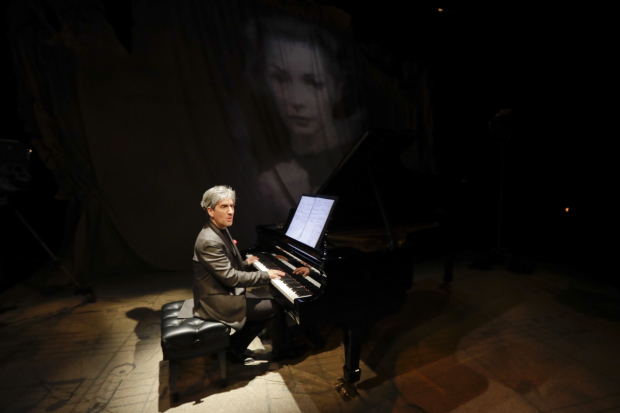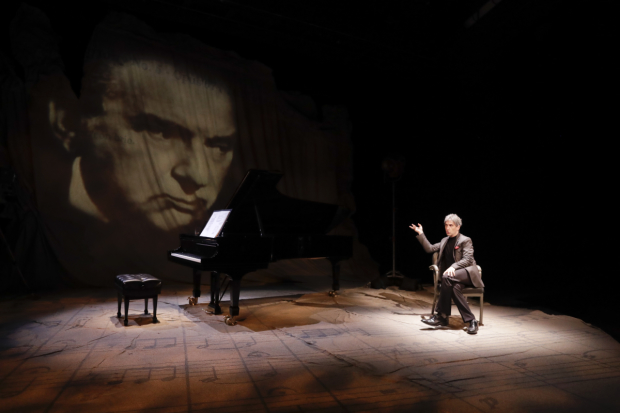Maestro

(© Hershey Felder Presents)
One would be hard-pressed to name an American titan of classical music more prominent than the late Leonard Bernstein. A longtime director of the New York Philharmonic, Bernstein toured globally as a conductor and hosted a series of nationally televised music lectures. Hundreds of millions of viewers tuned in worldwide on Christmas morning, 1989, to see him conduct an international ensemble in Beethoven's Ninth Symphony, marking the end of Communism. No conductor had ever so successfully harnessed the power of television to spread the gospel of classical music, and none has since. That's why it feels so surprising that playwright-actor-musician Hershey Felder's engrossing new solo play about Bernstein, Maestro (now playing at 59E59 Theaters), comes off as a real tragedy.
That is, until one considers the cruel tyranny of expectations: Bernstein thought of himself as a composer foremost, but precious few of his compositions ever pierced the popular imagination. His work for the musical theater (particularly West Side Story) is the major exception. In Felder's energetic telling (peppered lightly with emotional hearsay) that kind of middlebrow recognition is cold comfort for a man who considered himself a serious classical musician.
We can feel his bitterness from the opening moments, when Felder (as Bernstein) slinks in from the audience clutching a scotch and cigarette. Like a symphonic Norma Desmond, he watches one of his old Omnibus lectures projected in black and white on the upstage wall. What begins as a fairly dense talk on music theory transitions into something much more personal: a musical docudrama of Bernstein's life, narrated by the man himself.

(© Hershey Felder Presents)
We hear about his first encounter with an upright piano and his Russian-Jewish immigrant father, who disapproved of such "idol worship." His early relationships with conductors Serge Koussevitzky and Dimitri Mitropoulos set him on a path to his career as a conductor, which began in dramatic fashion at the age of 25, when he stood in for an ailing Bruno Walter during a nationally broadcast radio concert. "We American composers really do need an American conductor of our own," Aaron Copland tells him after dismissing Bernstein's composition as "crap." Apparently, even cultural luminaries succumb to backup careers.
Playing every character in the script, Felder fully commits to the kind of broad and ballsy choices necessary for a good solo show. That still doesn't alleviate the falseness that creeps into the play through some of the more contrived lines. Felder's Bernstein tends to hop around in his chronology, like a garrulous party host prone to tangents. Also, a ballistic finale feels abrupt and unearned. True, Bernstein had a lot of things to regret (he was a gay man married to a woman, after all), but until the final 10 minutes of the play, he meets the incongruities of his life with a shrug and a can-do attitude. His angry tirade at the end comes out of left field and is never satisfyingly examined.
While he isn't able to fully capture Bernstein's inscrutable spirit, Felder is a bit more successful in grasping the man's speaking patterns and dialect. Still, his costume (a gray suit with pocket square and a cheap-looking salt-and-pepper wig) is disappointingly amateurish, as if it has recently occupied the back corner of a university costume collection. Unsurprisingly, no designer is credited.
But if Felder's portrayal of Bernstein feels occasionally inauthentic, his musicality is the real deal. When he's not conducting an invisible orchestra, he's gracefully massaging a tune out of the piano. Felder is an extraordinary pianist, exhibiting natural phrasing and complete dynamic control. It's like seeing a really great concert in which the musician tells you the truth about his life, rather than the typical audience banter.
Felder has built several other bio-shows using the same mold (a composer's life story, told around the piano). Most recently, he starred as Irving Berlin at Town Hall. It's a thrilling way to theatrically present music without conforming to our conventional notions of musical theater.

(© Hershey Felder Presents)
Director Joel Zwick smartly adorns Felder's swing-and-miss script with design. At one point, a swelling orchestra joins Felder as he plays a (surprisingly full) piano transcription of Wagner's "Liebestod." The tempo impressively matches perfectly with Felder's, and the sound balance is superb. Sound designer Erik Carstensen creates similarly arresting moments with Beethoven's Seventh Symphony and Rimsky-Korsakov's Scheherazade. François-Pierre Couture's simple, piano-centric set features two side chairs and a large retro TV camera trained on the keys, live feed from which is occasionally projected on the upstage wall. Christopher Ash's tasteful projections accent Felder's storytelling with well-curated still photographs.
In the end, the showmanship of Maestro compensates for the messiness of the script. One of Leonard Bernstein's great legacies was his ability to bridge the gap between classical music and modern theater in a way that was always joyful and never cynical. With intelligent musical shows like this, Hershey Felder is helping to carry that banner forward.











